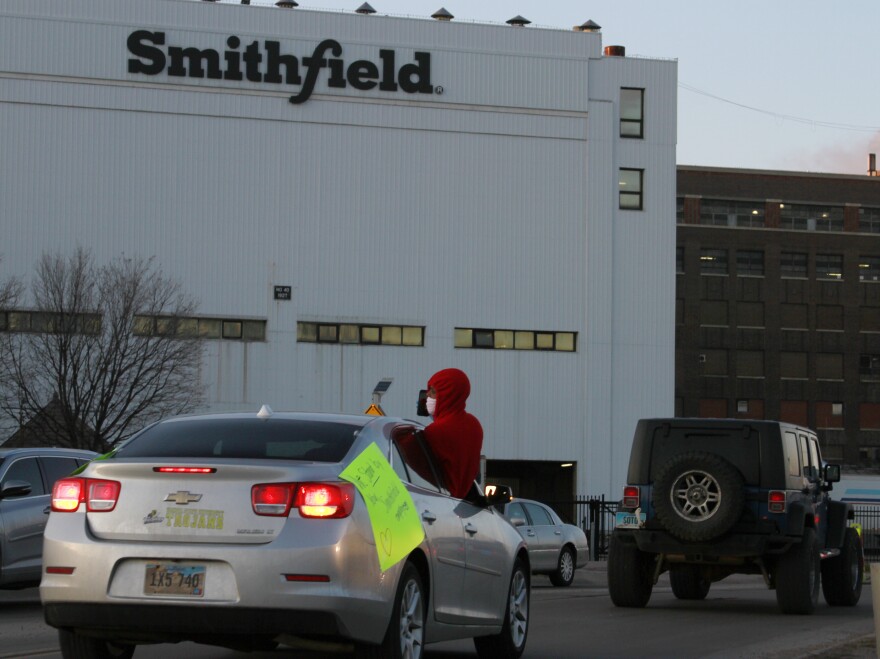Smithfield Foods, one of the biggest meat producers in the country, is operating its plant in Milan, Mo., "in a manner that contributies" to the spread of the coronavirus, according to a federal lawsuit filed Thursday in Kansas City.
The suit, brought by a plant worker identified as Jane Doe and by a nonprofit that advocates for plant workers, accuses Smithfield of failing to provide workers with sufficient protective equipment; forcing them to work shoulder to shoulder; giving them insufficient opportunities to wash their hands; discouraging them from taking sick leave; and failing to implement a plan for testing and contact tracing.
"Put simply, workers, their family members, and many others who live in Milan and in the broader community may die – all because Smithfield refused to change its practices in the face of this pandemic," the suit states.
The lawsuit says that "Smithfield is so unwilling to acknowledge its responsibilities to its workers and the communities where it operates that it recently blamed 'certain cultures' for the spread of the disease in its South Dakota plant ..."
Smithfield's South Dakota plant, which handles 5% of U.S. pork production, has become a coronavirus hot spot, with 783 workers testing positive for the virus so far and two of them dying. The first worker there tested positive for the virus on March 24, but the plant was not closed until April 14.
Smithfield also shut down its plants in Martin City, Mo., and Cudahy, Wis., last week because they rely on raw materials from the South Dakota plant, according to a Smithfield press release.
Another giant meat processor, Cargill Foods, recently confirmed that workers at its Marshall, Mo., facility had tested positive for COVID-19, the disease caused by the coronavirus. Cargill declined to say how many individuals had tested positive but said all staff who came in contact with them were being quarantined for 14 days. The plant, which employs some 620 people, remains open.
In a statement, Keira Lombardo, executive vice president of corporate affairs and compliance for Smithfield Foods, said the company does not comment on pending litigation but then said: "The health and safety of our employees is our top priority at all times. The allegations contained in the complaint are without factual or legal merit and include claims previously made against the company that have been investigated and determined to be unfounded. We look forward to aggressively defending the company in court."
The lawsuit doesn't seek money damages. Rather, it asks for an injunction to force Smithfield to comply with Centers for Disease Control and public health guidelines.
David Muraskin, a lawyer for the plaintiffs, said he was not aware of any other lawsuits seeking changes in production processes at plants, rather than monetary damages.
"All we want, all we are asking for is for it to aggressively defend its workers," Muraskin said. "If they do that our claims go away."
Muraskin said his legal advocacy group, Public Justice, served Smithfield Friday morning, and plans to file other similar suits going forward.
The plaintiff identified as Jane Doe works on the "cut floor" cutting pig meat for up to 11 hours a day, according to the suit. It says she's using a pseudonym because she fears retaliation for speaking out against Smithfield.
Doe says in the suit that she's aware of at least eight co-workers who have had to stay home after displaying COVID-19 symptoms.
Sullivan County, where the plant is located, has yet to report any confirmed cases of COVID-19, but the county health department says it doesn't know how many people have been tested.
The other plaintiff, the Rural Workers Community Alliance, is a small nonprofit that advocates for workers in northern Missouri, including employees at the Milan plant. Its single staff member, Axel Fuentes, lives in Kirksville — as do many plant workers — and Fuentes says in the suit that he fears for the health and safety of his family because his job brings him in close contact with plant workers.
Before the suit was filed, Fuentes said workers told him that they saw people working with COVID-19 symptoms because they feared losing their jobs.
"Workers are still being assigned negative points when they do not attend work, which eventually can end in the termination of the employment," Fuentes said.
Under a stay-at-home order issued by the Missouri health department on April 3, meat processing facilities are allowed to remain open but are supposed to observe CDC and other public health guidelines to protect their workers.
The lawsuit, however, says that Smithfield has failed to satisfy even minimum public health guidelines. For example, it says it wasn't until April 16 that any worker at the plant reported receiving a mask. And as of April 20, most of them were getting just one simple surgical mask from Smithfield every week and could get a new one only if the first one broke, according to the suit.
It also alleges that, in an effort to process as much meat as possible "as cheaply as possible," workers are forced to stand so closely together "that they are literally touching."
More than 150 of America's largest meat processing plants operate in counties where the rate of coronavirus infection is already among the nation's highest, according to an investigation by USA Today and the Midwest Center for Investigative Reporting.
"These facilities represent more than 1 in 3 of the nation's biggest beef, pork and poultry processing plants," the news outlets reported. "Rates of infection around these plants are higher than those of 75% of other U.S. counties, the analysis found."
Copyright 2020 KBIA


